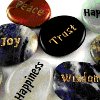
Image by Karen Smits
The world of distraction spins around and around, while moving continuously to keep itself amused and entertained. It transports us to a world of fantasy, or a world of controversy, or competition, or of just about anything other than the one true existence that is right before us. Distraction keeps our heads turned in the direction of momentary pleasures, excitement, and delight.
On the other hand, the cool heart, with its spiritual energy, is the sobering factor that keeps us focused on worthier goals. It tempers the euphoria of petty fun. It settles us firmly down on Earth, grounding and sobering us with a clear view into life's many facets in a balanced manner. The cool heart is unmoved by the intoxication of the world. The wise heart is the cool heart. It directs us to a profound state where we are liberated from the burden and stench of self-consciousness. Nothing can be better than that.
Manifesting The Impossible and Transforming Life
We must strive to do anything that can make the impossible and miraculous possible. A whole realm of good things opens up for us if we adhere to this way of thinking. Life is made for aspiration and for manifesting the impossible.
The following set of affirmations go right to the essence of this, to the sum and substance of inner transformation. If you have any time at all in your life that you want to devote to spiritual discovery, I suggest that you work with any of the following affirmations. When you realize that the profundity of any of them can radically alter your relationship to life, you embark on the best of all ways.
Jot down these thoughts on a notepad or card so that you can carry them around in your pocket and refer to them when you need to connect with reality. Keep them close at hand until they become a part of your thinking process. Once they settle into your mind, they can positively influence the flow of your life.
1. Life functions on many levels. If you choose to live on the comic-book level, your life will be without subtle refinement or poetry.
2. The quality of your life totally depends on your relationship to wisdom.
3. Look at life carefully and sensitively. Contemplate the challenges in your life that await your attention. These are the things you avoid or tend to set aside. These are the fears that lurk in the recesses of your mind and lie concealed there in the background.
4. Meet the challenge! Do the difficult! If you can't find anything difficult to do at a particular moment, try brushing your teeth with the opposite hand. Avoid the easy.
5. If you really want to resolve problems well, you must sit on them patiently until the solution pops up. Process them. If it doesn't pop up or process out, then it isn't your problem and there is nothing more to be done. And you can do that "nothing" with confidence.
6. Patience is the greater part of problem solving and action is the lesser part. We usually get it backward.
7. By continually putting yourself in the present, the future sorts itself out now.
8. Focus your heart on the big problems. The small problems will then take care of themselves.
9. It's not just cigarettes that are spiked to create addiction, but many other things that we consume in our daily lives, such as the TV news, ice cream, and rock hits.
10. Silence is a great asset. If you don't have any silence in your life, be kind to yourself and make some. Silence is a form of mercy.
11. The best medicines are those that work gradually to restore the original balance of your body, such as herbal remedies and homeopathy. Medicines that are formulated to kill the problem end up overkilling it. Nature won't tolerate this mode of problem solving; it presents the same situation in another form.
12. Illness is more of a warning than a problem. It is a signal that something is out of harmony.
13. Introspection will tell you what's out of the ordinary. This is the intelligent and sensitive way to approach illness.
14. The future is built on our hopes and aspirations. Any resolution or determination that you make can be realized in the future. You can experiment with this idea by resolving to quit a bad habit for ten days. Every conscious moment during those ten days reinforces your resolve. On the tenth day, investigate this situation from all angles and note what has occurred. You can use your discovery as a stepping stone to meditation and a path to the best possible aspiration.
15. Difficulty is relative. Only your mind makes the worthwhile appear to be beyond your capability. This is almost never the case. The same difficulty that may depress some is a piece of cake for a wise person. All things are relative to your state of mind.
16. On the one hand, there is intoxication of one sort or another. On the other, there is despair and depression of one sort or another. There is, however, a middle track. When you find that track and direct your life along it, it becomes broader. Life, unexpectedly, gets better. Moderation and balance honor your lifestyle.
17. It is shocking but true: Each one of us has received a death sentence.
18. The less you take things personally, the more detachment and coolness you will feel.
19. Be modest. Make yourself available to receive what is given. In this way, you will always be grateful and content with whatever you have.
20. Always keep to yourself in a mindful and reflective manner. This stance will put you directly into the hands of the universe. Then you will get exactly what you need at precisely the right time.
21. Cherish your life as a process. The results of your actions will take care of themselves naturally. Through this mode of being, you will develop poise, gratitude, and dignity -- a quality life.
22. The manner in which you carry out a deed is more important than the actual deed itself. It is the driving force that determines the consequences. Assuming this kind of posture inclines you toward a deeper education -- a path of wisdom and compassion that is far superior to any curriculum that any school can offer. The way we do anything is the way we do everything.
23. Aspire to go beyond the ordinary.
24. If you don't do good, who will?
25. Can you be as happy when things are just "okay" as when life is "on a high"? If you can, you've passed the course.
26. The mind is a vital, living "thing". It can be transformed to everyone's advantage. When you understand the point of human existence and recognize the worth of the tools available, you will be able to expand and integrate yourself at an accelerated rate.
27. Leave everything better than when you came upon it.
28. Be mindful of "over-thinking". Excessive thought leads to utter confusion.
29. Follow your gut feeling about what is right and do it!
30. Do what you need to do with a willing heart and with all the energy you can muster. This is the way to do things well.
31. A wake-up-your-life technique: Find your ears and pull on the lobes three times, squeezing and pulling vigorously. This draws energy into the brain and consciousness.
32. It is said that to be no one and want nothing is to be everything. Life is long enough for us to investigate this possibility. If this is true, it turns every notion we ever had inside out and presents us with an exciting, brand-new world.
33. Meditation is not just sitting with your eyes closed. It should continue when your eyes are open. Awareness of reality should become seamless. Eyes closed. Eyes open. Each action supports the next.
34. Future plans are fabrications built on banana peels. Instead, cultivate in the present an effort to do your best without expectation. Just resolve to be at peace with whatever comes up in the windows: be it cherries, oranges, bars, or the jackpot. Accept the possibility of change in any direction.
35. Everything-E-v-e-r-y-t-h-i-n-g-changes. All the time.
36. The best buys in this world: flowers, candles, and incense.
37. Make your body a harmonious organism. Keep it well by nurturing it with healthy food.
38. Unplug yourself from that which drains your heart energy. You may choose to think about this in terms of your "soul". But in the Buddhist reality, it is soul, as in "soul food", rather than an ongoing alias of who you now think you are.
39. Put yourself in the blessing mode. Sit in your center where everything is balanced. Radiate.
40. Your center is the center.
41. Kindle the world with your holiness.
42. Don't get stuck anywhere. There is no need to feel stuck in traffic. Use all your opportunities to your advantage. Traffic jams offer us increased personal time and reflective time. Actually, it is a gift. The red light is our ally. If the world were all green lights, we would have run ourselves off the edge by now.
43. Peace means no trouble. Period. If you go peacefully, there won't be any trouble.
44. Take five deep breaths and you will reconnect yourself to the real present. Five deep breaths can take you out from under any heavy situation. In extraordinary circumstances, five deep breaths can disentangle you from a problematic world, lifting you to a plane where you can simply observe things rise and pass away.
45. Everything that is ubiquitous is addictive. Try to find something that is not addictive in an airport gift shop!
46. Five things to encourage awakening: don't take things personally; all situations are really lessons; be a student to every moment; exceed your patience barrier (feel the distress of impatience); listen to silence.
47. Subdue the fear of death until death is afraid of you. Fear of death is a cultural implant.
48. It is obvious that we have the opportunity here and now to do whatever we want. However, there is a big catch to this illusory freedom. Mistakes do count. Later on, maybe two or three minutes later, we have to pay for our mistakes.
49. The harder you drive your life toward money and security, the harder it is to get enough of it. You never get enough of what you don't need.
50. Bowing and kneeling are important basic rituals. These gestures characterize a life lived fully, in humility, and in the gentle flow of grace. Practice the bowing until you learn to bow with the mind. This elegant ritual renews holiness and expresses with simple eloquence our gratitude for the opportunity to learn.
51. The major trick in life is to establish a symbiotic relationship with everything.
52. You must live your life through your conditioned character, but you don't have to act like a character. Life is not a sitcom.
53. Immersing yourself in things, situations, or objects is a sure-fire recipe for future agony.
54. Life is really more about letting go of things than of grasping more and more. It's about generating the passion to be empty of complexity and chaos.
55. Everything is one. Every moment is a recycling of every thought that has ever been born.
56. Nothing is far away. We are enshrouded in no-thing.
57. The things that fill the mind become lively bait for it. Thoughts arise on their own and serve as decoys for the grasping mind to latch onto and toy with.
 The intention of these words is not so much to arouse understanding as to nudge the mind gently toward a more subtle and incisive way of seeing. We would do well to recognize that much of our world consists of the ego-I and of latching on to sticky images. Our relationship with the world is mostly a sticky one. Wherever and whenever we stick, we suffer.
The intention of these words is not so much to arouse understanding as to nudge the mind gently toward a more subtle and incisive way of seeing. We would do well to recognize that much of our world consists of the ego-I and of latching on to sticky images. Our relationship with the world is mostly a sticky one. Wherever and whenever we stick, we suffer.
The ego-I is not who we are. It is fabricated out of sense impressions and karma. If it were truly us, we would not be able to observe it. The ego-I wants to pull things to itself and own them. This process takes place in our own mind without our authorization!
Careful Action and Intentional Awareness
Everything that goes on does so through the prism of awareness. Make careful action the continuous object of your awareness. Intentional awareness moves us and places us in the forefront of our work. This occurs as we see what needs to be done in any given situation. We must place carefulness above intention. Carefulness needs to preside above all our activities and cradle us within the present moment. Carefulness carries the ethical quality that makes for gracefulness and beauty.
Doing the next thing that comes before you is the easy way to success. Don't make a problem out of life and don't be ensnared in doubt and procrastination. just go in there and do it. Observe all the minute particulars, and then realize the essence of it. Then let go immediately so as not to get stuck anywhere. Learn as you go.
The beauty of spiritual qualities is that they bring forth much more than dry intellectual tolerance; they infuse loving kindness into all our relationships. There is nothing better than that.
We must say "no" firmly to some things -- for instance, old bad habits, and doing things to please and to be liked. Say "no" and you will like your sense of self better.
When we act out of self, we create a sequence of melodramas titled, "A Case of Mistaken Identity". If you look deeply into anything long enough, think about it, and utter its name, its apparent solidity collapses and deflates and then everything about it seems absurd!
Things exist in form only as long as the underlying sustaining qualities support it. The mathematician would tell us that a condition exists in any future "next moment" according to its probability. This is an interesting and accurate approach to truth, as well.
In a general sense, the term "middle class" is a synonym for low-security prison. This state of captivity is made acceptable by trappings of (mostly) pathetic pleasures. But it provides neither time nor space to be in touch with our inner source. Unless we look at the world from an entirely unfamiliar angle, it is impossible to see the haze that enshrouds us in our stagnation. Familiar means "dead."
The materialistic world owns most of the evocative words like love, ice cream, cookies, buffet, sex, and rock'n roll. We have to reinvent and reclaim our holy vocabulary.
Reprinted with permission of the publisher,
Red Wheel/Samuel Weiser Inc. ©2000, 2011.
http://www.weiserbooks.com
Article Source
Meeting the Monkey Halfway
by Ajahn Sumano Bhikkhu and Emily Popp. Simple and straightforward, this "little book" is a distillation of 20 years of a Buddhist monk's meditation practice. With a sense of reverence and respect for everything, Ajahn Sumano Bhikkhu shows us how to use only what we need, andthen to use these few things carefully and with discrimination. Meeting the Monkey Halfway is his personal story, and through his story he will help us to open our hearts and relearn the compassion of the Buddha.
Simple and straightforward, this "little book" is a distillation of 20 years of a Buddhist monk's meditation practice. With a sense of reverence and respect for everything, Ajahn Sumano Bhikkhu shows us how to use only what we need, andthen to use these few things carefully and with discrimination. Meeting the Monkey Halfway is his personal story, and through his story he will help us to open our hearts and relearn the compassion of the Buddha.
Info/Order this book. Also available as a Kindle edition.
More books by this Author
About The Author
 AJAHN SUMANO BHIKKHU was born in Chicago, Illinois. In the mid 1970s, he entered into a self-imposed three-year retreat in a meditation center in Massachusetts. Afterward, he became the first monk to be ordained in the forest tradition of Thailand at Cittaviveka Buddhist Center, West Sussex, England. Since 1985, he has been living and practicing in several meditation caves in Northeast Thailand and among the hill-tribe people of Northern Thailand. He can be reached by email at:
AJAHN SUMANO BHIKKHU was born in Chicago, Illinois. In the mid 1970s, he entered into a self-imposed three-year retreat in a meditation center in Massachusetts. Afterward, he became the first monk to be ordained in the forest tradition of Thailand at Cittaviveka Buddhist Center, West Sussex, England. Since 1985, he has been living and practicing in several meditation caves in Northeast Thailand and among the hill-tribe people of Northern Thailand. He can be reached by email at:
EMILY POPP, co-author of this book, is a long-time student and disciple of Ajahn Sumano Bhikkhu. Her efforts in helping to develop this book and other projects are her offering for the propagation of the Dhamma.

























